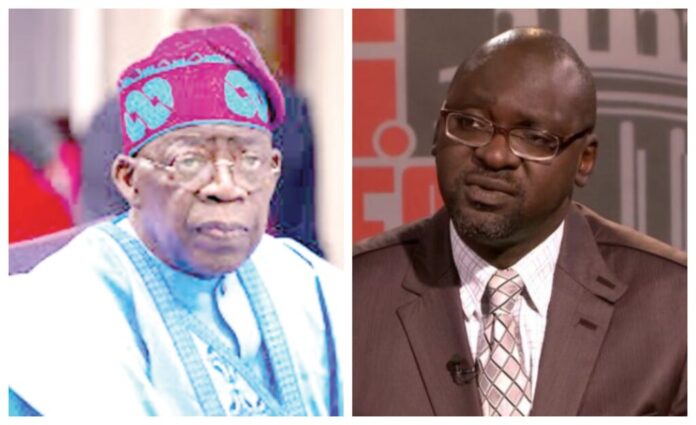Ogebe exposes why NNPC is world’s worst national oil company
By Jeph Ajobaju, Chief Copy Editor
Emmanuel Ogebe, in the second part of his article on the errors of Bola Tinubu, deep dives into the massive fraud in the Nigerian National Petroleum Company Limited (NNPCL) in the guise of borrowing billions of dollars to “defend” the naira on the foreign exchange market, whereas the loans are being spent at the discretion of the NNPC without oversight.
The NNPC is supervised directly by Tinubu, who is both President and Petroleum Minister.
Ogebe’s expose includes
- The Central Bank of Nigeria (CBN) borrowed $10 billion to “defend the naira” yet it is one of the worst performing currencies in the world
- Crude-for-loans worth $3 billion not tied to any known project, an amount from which the NNPC has drawn $2.25 billion with repayment scheduled to begin in the middle of 2024.
- The loan repayment is pegged at $65 per barrel (pb) but the oil value today is $78pb and expected to hit $100. At the current price and with crude at 90,000 bp, the creditor will gain an extra and Nigeria lose an additional $1 million daily apart from other loan repayment terms!
- The NNPC is acquiring more debt than its revenues and thus the world’s only insolvent national oil company that is operating at a loss.
- NNPC administrative expenses included N13 billion on staff entertainment, N20 billion for telephone calls and postage within a two-year period.
- It spent an average of N561.125 million every month (N18.447 million spent daily) on entertainment between 2020 and 2021, and N768,664 hourly.
- It spent N788.7 billion on administrative expenses in 2021, an increase from N648.6 billion in 2020, bringing total admin expenses to more than N1.4 trillion in two years.
- Nigeria attracts more diaspora remittance than it makes from oil sales, but the incentive for diasporans to keep on sending hard currency back home has been stopped by the CBN.
The article Ogebe sent to TheNiche is published in full below:
NNPC a liability, not an asset to Nigeria
In this second installment of my independence special report of Tinubu’s five tactical blunders, I am focusing on one of the most disturbing discoveries – that rather than being an asset to the nation, NNPC has become a liability putting the nation into deeper debt aggressively.
To recap, CBN Governor Yemi Cardoso recently said:
“Oil production must be ramped up to levels that can support the economy, and we need to diversify beyond our current status as a monolithic economy reliant on oil. Until this happens, the strong exchange rate we all desire will remain out of reach.”
The question now is, if Cardoso was aware of this as the only solution to the naira being one of the worst performing currencies in the world, why did federal government borrow $10 billion to “defend the naira”? More importantly where is the $10 billion now?
Oil-exporting (production) and people-exporting (migration) are two major foreign exchange sources for Nigeria via NNPCL and diaspora remittances respectively.
Brazil’s Petrobras reported a net profit of $25 billion in 2023, Petronas in Malaysia reported $19 billion and Russia’s Gazprom reported $14 billion even under Ukraine war economic sanctions but NNPCL reported a paltry $2 billion in December 2023.
Yet NNPCL is acquiring more debt than its revenues and thus the world’s only insolvent national oil company that is operating at a loss.
Crude for loans
In an article entitled “Crude-for-loans: NNPCL votes 8million barrels monthly for $8.8bn debt,” Punch newspaper reports:
“Firm repays $2.61bn, owes $6.25bn as Nigeria loses 264m crude barrels to theft, others.”
Out of the list of mostly opaque loans, of great interest to me was the mystery $3 billion borrowed last year tied to no known project.
Per Punch, “More recently, there was the Project Gazelle deal, which aimed to stabilise Nigeria’s foreign exchange market.
“In December 2023, NNPC secured a $3 billion forward sale agreement, pledging 90,000 barrels per day (bpd) from Production Sharing Contract assets to cover future tax and royalty obligations.
“As of the end of 2023, $2.25 billion had been drawn from this facility, with repayments scheduled to begin by mid-2024.
“These crude-for-loan deals come at a time when Nigeria is struggling to boost its oil production…”
Basically, NNPC borrowed $3 billion and utilized $2.25 billion in December to “stabilize the naira.” What does that even mean?
“On August 17, 2023, The PUNCH reported that the NNPC announced that it had secured a $3.3bn emergency crude oil repayment loan from the African Export-Import Bank.
“It explained at the time that the oil company would use the loan to support the Federal Government in stabilising Nigeria’s exchange rate…
“The facility, among other things, would help the Federal Government attend to some of its dollar obligations, assist the Central Bank of Nigeria in stabilising the foreign exchange market, and provide funding for NNPC.”
NNPC borrows to stabilise itself, not naira
We discover here in black and white that the billions borrowed to stabilize the naira was actually used to fund the NNPC “among other things!” Not only is Nigeria borrowing to pay debt but NNPC has joined the league of borrowers club.
“Providing details about the deal in the document titled, “Everything you need to know about the NNPC Limited’s $3.3bn loan, also known as Project Gazelle,” the NNPC said, “This is a financing agreement secured by NNPC Limited to prepay future royalties and taxes to the Federal Government.
“The company also stated that it adopted a lower price benchmark for the $3.3bn crude-for-cash loan to reduce the risk of default and ensure financial stability.”
All of a sudden here, we see a discrepancy between the $3 billion borrowed versus $3.3 billion borrowed! That’s a $300 million unexplained difference.
“Giving details on the benchmark oil price, the company said the facility used a conservative crude price of $65/barrel to calculate the allocated crude to be produced and sold.
“NNPC also said repayments were strategically planned and tied to future oil sales, with conservative pricing in oil sales contracts mitigating the risks associated with oil price volatility.”
The loan repayment is pegged at $65pb but the oil value today is $78pb and expected to hit $100 due to the Mid East conflict. Based on the current price at 90,000 bp, the creditor will gain an extra and Nigeria lose an additional $1 million daily apart from the other loan repayment terms!
However, the “all you need to know” about the amorphous Gazelle project doesn’t really tell us anything because “stabilization of the naira” is an intangible non-entity. But funding the NNPC, that’s something that can be tracked.
NNPC administrative expenses
NNPC administrative expenses included N13 billion on staff entertainment, N20 billion for telephone calls and postage within a two-year period. NNPC spent an average of N561.125 million every month (N18.447 million was spent daily) on entertainment between 2020 and 2021, and N768,664 hourly.
NNPC spent N788.7 billion on administrative expenses in 2021.
This is an increase from N648.6 billion reported in 2020, bringing NNPC’s total admin expenses to over N1.4 trillion in two years.
We looked extensively at oil-exporting so let’s turn briefly to people-exporting for comparative analysis.
Impact of diaspora remittance on economy
Unlike NNPC, Diaspora Remittance is organically self-driven. However, the CBN introduced a 5Naira-to-$1 incentive which increased weekly forex inflows by over 1,500 per cent!
Diaspora remitted $21.9 billion in 2022 costing CBN roughly N100 billion in contrast to almost N800 billion NNPC admin costs and $1.5 billion remittance!
That’s only about 15 per cent of the forex that Diaspora generates while Nigeria only spent 15 per cent of what NNPC consumes on Diaspora incentive that brought in tens of billions of dollars!
Nigeria’s human capital is more valuable than its oil minerals.
CBN should simply have paid N100 billion ($65 million) to attract $20 billion from Diaspora remittance to stabilize the naira instead of NNPC to borrow $10 billion (N15 trillion) which will be back with over 100 per cent interest (N30 trillion) without improving the exchange rate.
In fact, Zenith Bank alone made $66 million signature fee on the $3 billion AFREXIM foreign loan – more than the $65 million the entire Diaspora would have made to bring in $20 billion into the economy!
Intervention by NASS
Even more shockingly, per Punch, “The House of Representatives Special Joint Committee recently directed NNPC to halt further crude-for-loan agreements.
“This directive follows reports that the company is planning to borrow an additional $2bn in oil-backed loans amid efforts to settle a $6bn backlog owed to international oil traders, particularly following the removal of fuel subsidy.
“The PUNCH earlier reported that the NNPC was in talks for another oil-backed loan to boost its finances and allow investment in its business, according to the Group Chief Executive Officer, NNPC, Mele Kyari.
“Kyari said the company wanted the new loan against 30,000-35,000 barrels per day of crude production, though he declined to say how much money it sought.
“Nigeria’s government finances rely on oil the NNPC exports, which provides the bulk of crucial foreign exchange reserves…”
It is unbelievable that NNPC is borrowing money left, right and center “to boost its finances” mortgaging future oil sales but it is even more disturbing that they’re not disclosing the debt size or usage.
It is good that the NASS (National Assembly) has urged a halt to this irresponsible borrowing but deeper investigations should be done into NNPC’s profligacy which clearly borders on criminal.
“So far we have only identified the $3 billion future oil sales loan for naira defense which NNPC is using for itself. We haven’t found out where $7 billion loan from future gas earnings is yet.
- To be continued.
– Ogebe is a US-based lawyer and Nigeria international affairs expert with the US Nigeria Law Group, Washington.
__________________________________________________________________
Related articles:
Tinubu’s 5 tactical errors at independence anniversary and how he could have fixed them (Part 1)
First anniversary of Tinubu’s state capture showcases wasteful wandering in the wilderness
Setting captives free and records straight on Leah Sharibu’s 21st birthday
___________________________________________________________________







